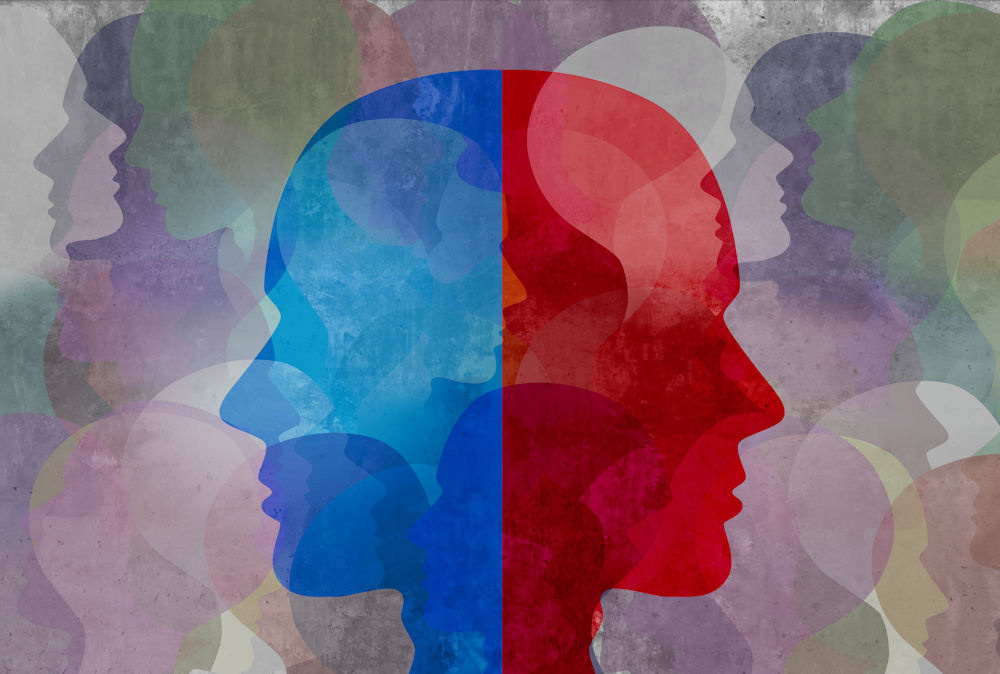Bipolar disorder affects millions of people worldwide, with an estimated 4.4% of U.S. adults experiencing this complex mental health condition at some point in their lives. This disorder doesn’t just impact mood and emotions; it physically alters parts of the brain that regulate decision-making, emotions, and stress responses. At Crestview Recovery in Portland, Oregon, we understand how deeply bipolar disorder can affect every aspect of a person’s life.
Our comprehensive programs for mental health include outpatient care, partial hospitalization, intensive outpatient treatment, and dual diagnosis services. Our programs are designed to provide the personalized help you or a loved one needs. Understanding how bipolar disorder influences the brain is the first step toward effective treatment and lasting recovery from this disorder.

How Does Bipolar Disorder Affect the Brain?
Bipolar disorder is a complex mental health condition that not only influences mood and behavior but also makes distinct changes to the brain’s structure and functionality. This disorder is characterized by extreme emotional highs (mania or hypomania) and lows (depression), often creating unpredictable challenges for those who experience it. These shifts aren’t just psychological but are deeply rooted in neurobiology. Studies have shown that bipolar disorder affects several key parts of the brain, which helps explain the intense mood swings, impulsive behaviors, and cognitive difficulties associated with it. By understanding how the brain changes with bipolar disorder, we can shed light on the emotions and challenges individuals face and pave the way for more effective treatment options.
When someone has bipolar disorder, their brain functioning can become dysregulated in several ways. Neurotransmitter imbalances, altered connectivity between regions of the brain, and structural differences all contribute to the condition’s symptoms. People with bipolar disorder may experience heightened emotional responses, difficulty in controlling impulses, impaired judgment, and struggles with memory and learning. Flaws in personality or willpower do not cause these issues; they are the result of specific physiological changes in the brain.
For example, during a manic phase, someone may feel euphoric, overly confident, or energized, often making reckless choices because their brain’s decision-making centers are overactive. Conversely, in periods of depression, they might feel overwhelmed by sadness, fatigue, or hopelessness, stemming from underactivity in regions that regulate mood and motivation. Now, let’s take a closer look at the primary brain regions affected by bipolar disorder and how these changes manifest.
The prefrontal cortex is the area of the brain responsible for decision-making, impulse control, and logical thinking. Research has found that people with bipolar disorder often experience decreased activity in this part of the brain, particularly during depressive episodes. This underactivity can lead to impaired judgment, difficulty planning or focusing, and an inability to regulate impulsive behaviors.
For example, during a manic episode, the lack of control from the prefrontal cortex may lead someone to engage in risky behaviors, such as impulsive spending, drug use, or engaging in unsafe activities. Meanwhile, in depressive states, individuals might struggle to make even small decisions or feel paralyzed by their inability to think clearly about a situation.
The amygdala is a critical part of the brain that processes emotions like fear, anger, and joy. For individuals with bipolar disorder, the amygdala often becomes overactive during manic or depressive phases. This heightened sensitivity can lead to intense emotional reactions and an inability to properly regulate these feelings.
For instance, during mania, someone might feel overwhelming excitement or irritability because the amygdala is hyper-responsive to emotional stimuli. On the flip side, during depressive episodes, the same overactivity could enhance feelings of sadness, guilt, or worthlessness, making these emotions feel inescapable. This dysregulation often contributes to the unpredictable mood swings that define the disorder.
The hippocampus is vital for forming and retrieving memories, as well as connecting emotions to those memories. Studies have noted that individuals with bipolar disorder often have a smaller hippocampus compared to those without the condition. This shrinkage may be due to excessive stress or chronic inflammation in the brain.
A smaller or less functional hippocampus can lead to memory problems, making it harder for people with bipolar disorder to recall details or learn new information. It may also contribute to feelings of disorientation or an exaggerated emotional response to past events. For example, someone may feel unreasonably guilty about something they can’t fully remember, or experience intense distress when recalling a painful memory.
Subcortical structures include regions like the basal ganglia and thalamus, which are responsible for processing information, regulating movement, and maintaining energy levels. These areas often show abnormalities in individuals with bipolar disorder, contributing to both the physical and cognitive symptoms of the condition.
During mania, hyperactivity in these structures could lead to restlessness, excessive energy, or an inability to sit still. This aligns with the classic manic behaviors of pacing, talking rapidly, or engaging in nonstop activity. On the other hand, in depressive episodes, reduced functioning in these areas might lead to extreme fatigue, lethargy, or sluggish physical movements, even when the mind feels overwhelmed.
Neurotransmitters and Bipolar Disorder
Neurotransmitters are chemical messengers in the brain that help transmit signals between nerve cells. Imbalances in these neurotransmitters are believed to play a significant role in bipolar disorder. The primary neurotransmitters involved include serotonin, dopamine, and norepinephrine.
Serotonin is often referred to as the “feel-good” neurotransmitter because it helps regulate mood, appetite, and sleep. Low levels of serotonin are commonly associated with depressive episodes in bipolar disorder. Medications that increase serotonin levels, such as selective serotonin reuptake inhibitors (SSRIs), are often used to treat depression.
Dopamine is linked to the brain’s reward system and is involved in motivation and pleasure. During manic episodes, dopamine levels may be elevated, leading to increased energy, euphoria, and impulsive behavior. However, an imbalance can also result in a lack of motivation and pleasure during depressive episodes.
Norepinephrine plays a role in the body’s response to stress and is involved in regulating arousal and alertness. In bipolar disorder, fluctuations in norepinephrine levels can contribute to the extreme mood changes experienced by individuals. High levels may be associated with mania, while low levels can lead to depression.
Brain Structure Changes in Bipolar Disorder
Research has shown that individuals with bipolar disorder may experience structural changes in the brain. These changes can affect how the brain functions and may contribute to the symptoms of the disorder.
Volume Changes
Studies using brain imaging techniques have found that certain brain regions, such as the prefrontal cortex and hippocampus, may have reduced volume in individuals with bipolar disorder. These volume changes can impact cognitive functions and emotional regulation, making it more challenging for individuals to manage their symptoms.
White Matter Integrity
White matter is the part of the brain that contains nerve fibers and helps different brain regions communicate with each other. Research has indicated that individuals with bipolar disorder may have abnormalities in white matter integrity, which can affect the efficiency of communication between brain regions. This disruption may contribute to mood instability and cognitive difficulties.
Environmental Factors and Brain Function
While biological factors play a significant role in bipolar disorder, environmental factors can also influence brain function and the severity of symptoms. Stressful life events, trauma, and substance abuse can exacerbate the condition and lead to changes in brain structure and function.
The Role of Stress
Chronic stress can have a profound impact on the brain, particularly in individuals with bipolar disorder. Stress can lead to increased levels of cortisol, a hormone that can affect mood and cognitive function. Over time, chronic stress can contribute to structural changes in the brain, such as reduced hippocampal volume, which may worsen symptoms.
Substance Abuse
Substance abuse is common among individuals with bipolar disorder and can complicate treatment. Drugs and alcohol can alter brain chemistry and exacerbate mood swings. Additionally, substance abuse can lead to poor decision-making and impulsive behavior, further complicating the management of bipolar disorder.
Treatment Options for Bipolar Disorder

Understanding how bipolar disorder affects the brain can help in developing effective treatment strategies. Treatment often involves a combination of medication, therapy, and lifestyle changes aimed at stabilizing mood and improving overall functioning.
Medications are a cornerstone of bipolar disorder treatment. Mood stabilizers, antipsychotics, and antidepressants are commonly prescribed to help manage symptoms. Mood stabilizers, such as lithium, can help reduce the frequency and severity of mood swings, while antipsychotics can help alleviate symptoms of mania.
Therapy can be a valuable tool in managing bipolar disorder. Cognitive-behavioral therapy (CBT) is often used to help individuals identify and change negative thought patterns and behaviors. Other therapeutic approaches, such as family therapy and interpersonal therapy, can also be beneficial in providing support and improving communication.
In addition to medication and therapy, lifestyle changes can play a significant role in managing bipolar disorder. Regular exercise, a balanced diet, and good sleep hygiene can help stabilize mood and improve overall well-being. Mindfulness practices, such as meditation and yoga, can also reduce stress and enhance emotional regulation.
The Importance of Support
Living with bipolar disorder can be challenging, not only for those diagnosed but also for their families and loved ones. Support from friends, family, and mental health professionals is crucial in managing the condition. Open communication and understanding can foster a supportive environment that encourages individuals to seek help and adhere to their treatment plans.
Building a Support Network
Creating a support network can be incredibly beneficial for individuals with bipolar disorder. This network may include family members, friends, therapists, and support groups. Connecting with others who understand the challenges of bipolar disorder can provide comfort and encouragement.
Education and Awareness
Education about bipolar disorder is vital for both individuals living with the condition and their support systems. Understanding the symptoms, triggers, and treatment options can empower individuals to take an active role in their mental health. Raising awareness can also help reduce stigma and promote empathy in society.
Find Hope and Healing at Crestview Recovery in Portland, OR
If you or a loved one is navigating the complexities of bipolar disorder and/or substance use, Crestview Recovery offers a compassionate and professional environment to foster healing and hope. Our dedicated team in Portland, Oregon, is committed to providing personalized care, recognizing that each journey to recovery is unique. We offer a comprehensive range of treatments, including residential treatment, mental health PHP, IOP, intensive outpatient trauma therapy, and dual diagnosis treatment. Whether you need structured, round-the-clock support or more flexible outpatient care, our services are designed to help you regain control and begin a new chapter in life. Don’t let the challenges of chemical dependency and mental health conditions hold you back—Contact us today to learn how we can support you on your path to recovery.
































